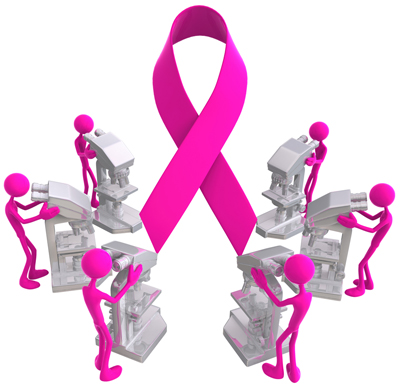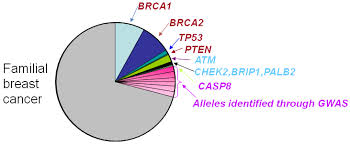Familial Breast Cancer
|
Familial Breast Cancer
Most cases of breast cancer occur by chance. However, breast cancer does occur more often than usual in some families because of their genetic make-up. Genetic means that the condition passed on through families through special codes inside cells called genes. The genetic 'makeup' is important because the material inherited from the parents controls various aspects of body.

Some facts about breast cancer
- Breast cancer is one of the most common cancers in the world.
- The biggest risk factor for developing breast cancer is increasing age. Most cases develop in women over the age of 50.
- Of women who do develop breast cancer, most do not have a strong family history of the disease. However, some women do come from families where breast cancer occurs more often than usual.
- If breast cancer detected in an early stage, there is a good chance of a cure. X-ray testing of the breast (mammography) can detect breast cancer at an early stage.
Breast cancer, genes and family history
- The cause of breast cancer is probably a combination of factors. These include lifestyle factors, environmental factors, hormone factors and probably other unknown factors. Genetic make-up is another factor, which known to be involved.
- Scientists identified three genes that related to be the cause of breast cancer. The change of these genes called a mutation. When they are faulty, they are particularly associated with breast cancer. These are the BRCA1, the BRCA2 and the TP53 gene mutations.
- If the woman carry one or more of these mutations, she has an increased risk of developing breast cancer (and certain other cancers such as ovarian cancer). In addition, the cancer tends to develop at an earlier age than usual. These gene mutations are just the main ones so far identified which related to breast cancer. There are probably others, which cause a smaller increased risk, which have not yet identified.
- About 1 in 20 women are likely to carry a faulty gene that gives them a higher risk than the general population of developing breast cancer. This may vary from a moderate increase in risk to a high risk. A person inherit half of the genes from the mother and half of the genes from the father.
Note:Not all women with these faulty genes will develop breast cancer. It is just that the risk is increased.

Assessing Risk:
As breast cancer is common, many of us will have a relative who diagnosed with breast cancer. This is not usually due to any of the faulty genes mentioned above, but is more often by chance. Most women with a family history of breast cancer do not have a greatly increased risk of developing breast cancer compared with the normal risk of the general population. However, some women are at greater risk than usual.
If the risk is assessed as normal or near-normal
Most women have a normal or near-normal risk of developing breast cancer. That is about a 1 in 8 chance of developing breast cancer - most commonly after the age of 50. If the risk is normal or near normal, woman should still consider the usual advice to women.
That is:
- Be breast aware
- Go for routine breast screening
- Consider altering other factors, which may affect the risk of breast cancer:
- If you are past the menopause and are overweight or obese, losing some weight will reduce your risk.
- Regular exercise reduces the risk.
- If you have children, women who breast-feed have a reduced risk of developing breast cancer compared with those who bottle-feed.
If the risk is assessed as moderate or high
You will get a referral to see a doctor who is a specialist. He or she will make a detailed assessment of your risk based on family history. You may offered a genetic testing and counselling. This usually done in a specialist genetics clinic. This may involve tests to see if you carry one or more of the faulty genes mentioned above. A blood test may also collected from your family member who has breast cancer. Depending on the outcome of the tests and assessment of the risk, some women offered regular tests such as mammography or MRI scans for screening from an early age. The timing and frequency of any screening tests will depend on your own individual risk. For a small number of women, whose risk is very high, surgery to remove the breasts and/or ovaries before cancer develops may be an option. This is not an option which is taken lightly and is only done after full risk assessment and counselling. Several medicines (tamoxifen and raloxifene) have also show to reduce the risk of breast cancer in women who are at increased risk of the disease.
Resources:
http://www.patient.co.uk/health/breast-cancer-hereditary-factors
|
Last Update
12/3/2014 9:55:34 AM
|
|
|
|